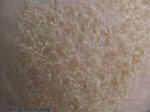Allergic Conjunctivitis
Affects Your Eyes, Though
Not For Long With Treatment
Allergic conjunctivitis is one of the types of conjunctivitis.
Conjunctivitis is a condition that affects your eyes. It makes your eyes red, itchy and watery.
You may also get a sticky film on your eyelashes.
In the morning you may find that this sticky film means that you're unable to open the eye that is affected.
There are several different types of conjunctivitis.
Allergic conjunctivitis is the type that is classed as an atopic condition.
Causes
It is caused by an allergic reaction to a substance.
The main culprits are
If you are allergic to pollen, which is at certain times of the year, it is called Seasonal Allergic Conjunctivitis. Your symptoms would affect you during the hay fever season.
Pollen comes from
- Grasses. You would normally be affected between May and August
- Trees. Different trees would affect you at different times. The most common allergen is birch, which is worse in April
- Weeds. You would
normally be affected around September/October
If you allergic to
house dust mites, which can affect you all year, it is called
Perennial Allergic Conjunctivitis.
It is very useful if
you know what allergen causes your conjunctivitis. You would be able
to limit contact with it, so stopping the symptoms before they start.
Symptoms Of Allergic Conjunctivitis
The main symptoms to look out for include
- both of your eyes will likely be affected
- the whites of your eyes will become red (hence why some people call it 'red eye')
- your eyes will be watery, and there may be a sticky glue on your eyelashes
- your symptoms will
generally be worse in the morning if you are allergic to
pollen. Look out for a runny or blocked nose, and sneezing
It is important not to
rub your eyes. This can make the inflammation worse.
Also if you wear
contact lenses it is a good idea not to wear them while you have any
of the symptoms.
Once you have been diagnosed you can start treatment.
Treatment
There are a few different treatments that you can use to improve the condition.
- If your symptoms are mild you may not need any other treatment. Just avoid the allergen, and avoid rubbing your eyes
- Antihistamines. These help with treating an allergy. They may reduce eye symptoms. But are more useful if pollen is the allergen. As they help to improve the runny or blocked nose, and the sneezing
- Eye drops. These will reduce the allergic reaction. There are 2 types
- Antihistamine eye drops. Provide quick relief. You can get them on prescription, though some are available to buy over the counter
- Mast Cell Stabilisers. Slower to work. They provide relief over a longer period of time. So until they work fully you maybe advised to take antihistamine tablets too
- Oral Steroids. You maybe given a short course, no longer than a week. Though they are only prescribed if your symptoms are severe. They are not recommended for long term use
This type of conjunctivitis doesn’t generally cause any major problems. It normally clears up within a few days.
If it is not improving
as it should, visit your doctor.
Also visit your doctor
if
- Your symptoms change
- Your eyes get very red, especially if it affects just one eye
- Your eyes feel painful. They may feel a little sore with conjunctivitis, but not painful
- You are sensitive to light
- Spots appear at the side of your eyes
They all indicate that
you may have a different condition. So visit your doctor so you
can get the right treatment for the condition you have.
If you are not sure if your conjunctivitis is caused by an allergy, or if it is, by what allergy, having an allergy test maybe the answer.
You can read about the different types of allergy tests available
Luckily allergic conjunctivitis will not normally affect your life in an adverse way. Especially in the long term.
If you limit contact will allergens, and start treatment as soon as you see any symptoms, managing it will be a piece of cake.
Return From Allergic Conjunctivitis to Atopic Disease
Return From Allergic Conjunctivitis to What Is Eczema
Search What Is Eczema?
Advertising on What Is Eczema?
We are a participant in the Amazon Services LLC Associates Program, an affiliate program which allows sites to earn fees by advertising and linking to amazon.com. If you make a purchase through a link on this page, I may receive a small commission, at no extra cost to you. Many thanks
